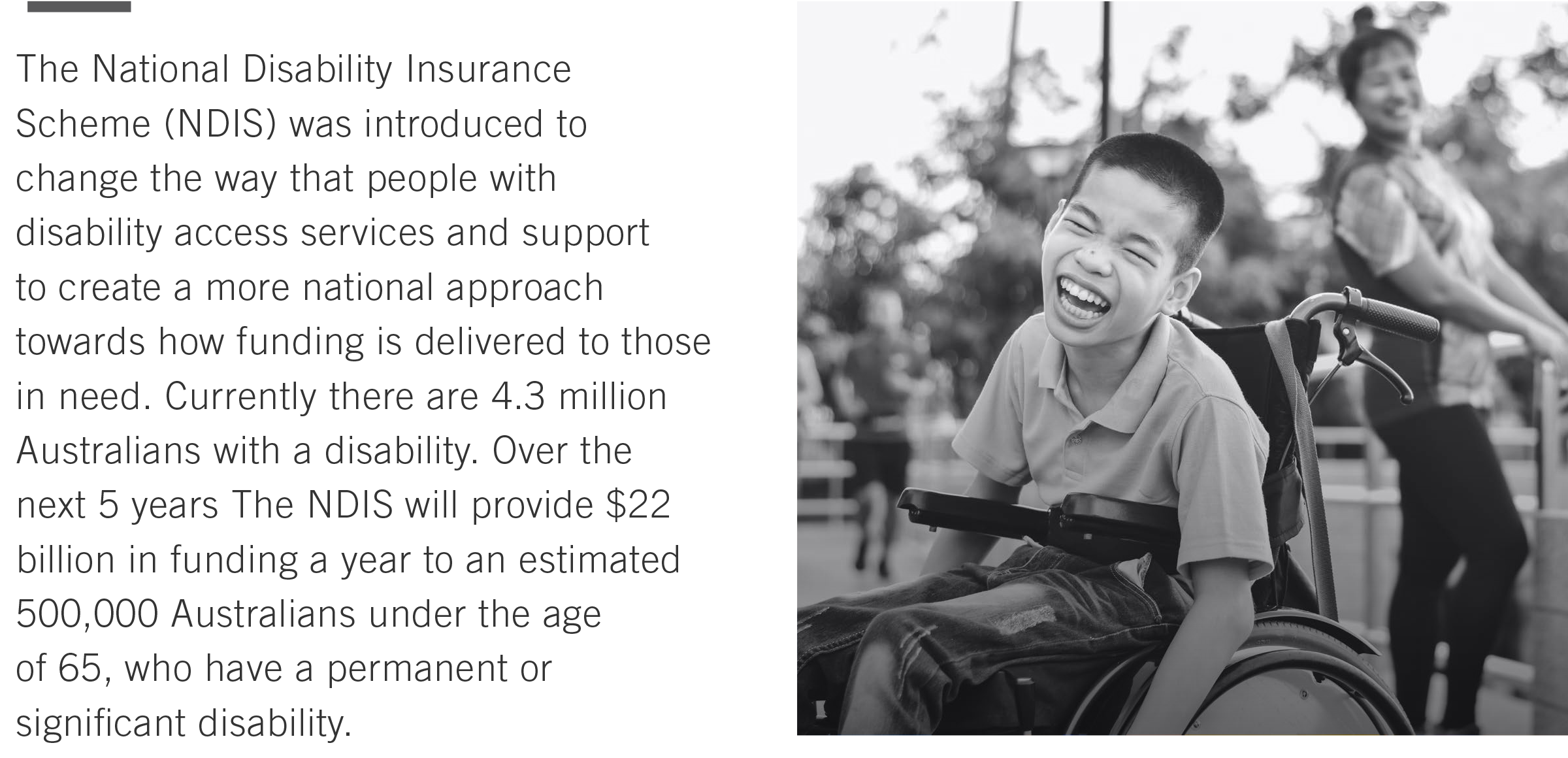

the current situation

The ABC reported a recent review highlighted the NDIS as ‘frustrating, difficult to understand’ and ‘bogged down in red tape and bureaucracy’. Initial teething issues continue to be addressed as the scheme evolves and grows.
The full launch in 2016 was considered a disaster with many administrative problems plaguing the roll out. An IT meltdown saw long delays in care packages being approved, critical staff were untrained, and the processing of applications ground to a halt. As a result, a huge backlog of applications emerged. There were then rushed and approved over the phone with inconsistent packages being approved and implemented. Today, the NDIA internal processes remain under scrutiny with the scheme’s IT systems still struggling to facilitate it’s demands.
Following the 2019 May election, the Federal Government commissioned former senior public servant David Tune to review the NDIS. The results released in January 2020 listed 29 recommendations to improve the scheme. It won’t be a quick fix, with estimate of several years before the scheme is running smoothly. As we know, there will always be discrepancies between what people expect from the scheme and what it can provide. Managing these expectations is part of the process.

One of the main complaints of the scheme is the inability for those over the age of 65 to access the program if they are not already on the NDIS scheme. So effectively, if you acquire a disability and you have already celebrated your 65th birthday, you can only access support through the aged care system via My Aged Care. This current system is viewed as discriminatory for older Australians who acquire a disability later in life. With an aged care sector deep in crisis as it is, there is significant pressure for My Aged care to cater more effectively for those needing significant care.
There is no doubt that as such a huge scheme rolls out, it will indeed find glitches, but the scheme will be improved and refined to one that will hopefully improve the lives of all those Australians requiring additional care and support. On a positive, NDIS participants have access to a wide range of therapy services where they can choose their own therapy provider on an ongoing basis.
The scheme is fantastic when it works. It allows those Australians who require extra support to access their choice of provider, cutting down on bureaucratic delays and expenses. Feedback suggests there a few final kinks to be ironed out however, in order to be operating at peak efficiency.

Meet Chris. Chris is a father, an active member of the Airey’s Inlet community, a keen cyclist,”pong” player, and a person living with multiple sclerosis. He credits the NDIS and his support worker to help him though his journey. The funding allows for participation in a local exercise program as well as other daily living assistance, helping him to stay in his home and local town.
Or Sue, a sufferer of MS for 17 years, who is still enjoying living at home with independence thanks to the help of her support worker Clare. “It’s very important for me to have my independence, get around and do the things I want to do and have a better life.” Says Clare.
Or take Thomas who is living with Autism and an intellectual disability. His mother credits the NDIS on helping Thomas find his independence and ultimately, his, and their families, freedom. The NDIS supported Thomas in accessing community services, travelling, staying mobile and to socialise in his chosen activities. His plan was centred around him, and now the entire family is benefitting from increased independence and freedom.

For those on the NDIS and looking to make the most of their plan, numerous therapy services are available. Allied Health professionals are instrumental in delivering these services to those Australians in need.
In its own words, the NDIS will cover “therapeutic supports, including behaviour support.”
There are three main categories in an NDIS plan that can effectively cover therapies. By understanding these, participants can make the most of their NDIS plan and access a greater variety of services than they may have known possible.
- Improved Daily Living
Those therapeutic services that improve your daily living skills. - Improved Relationships
Those services designed to improve your relationships and interactions with others. - Improved Health and Well-Being Those services designed to support and enhance your physical wellbeing and mobility.
Demand for allied health professionals in Australia is huge and is showing no signs of slowing down. With the number of Australians currently accessing the NDIS and the influx of Australians applying for the scheme, we are in high need of qualified and experience personnel to fill these roles.
With an increased number of both private and public companies now able to supply services, the variety of employment in the allied health field continues to grow. It is an exciting time to enter the market as a new grad and provides clinical diversity for experienced practitioners. With increased demand comes increased job stability and room for personal growth.

Allied Health Professionals are crucial to the ongoing success of the NDIS across Australia and Limelight People are proud to offer support and guidance when it comes to securing a new role in this setting, or in the field in general.
Limelight People are also passionate about working with organisations supporting our vulnerable populations. We are on hand to offer support and advice around workforce planning and hard to fill roles.
For further information reach out today! info@limelightpeople.com.au







